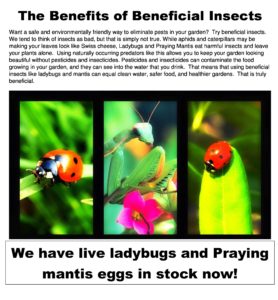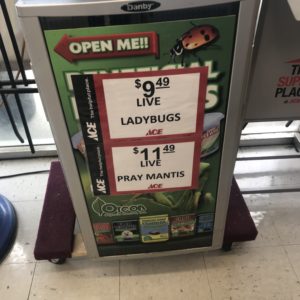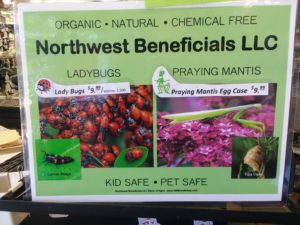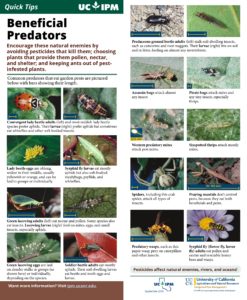You have (hopefully) been in the store and saw a sign kind of like one of these:



But do you know why we carry beneficial insects?
This blog is going to help the new gardener learn about beneficial insects, and hopefully, seasoned pros can learn some interesting things as well!
Okay, the first question newbies tend to have is: I spend a lot of money on insecticide, why would I want to put insects back in my garden?
To fully answer this we need some science. You see your garden needs insects. Some are there to pollinate, without which nothing would repopulate, and you would get no fruit. Some are there to make the soil better, like worm casings (which just sounded better than calling it what it actually is: worm poop that makes your garden soil amazing and helps things grow). And while yes, some are harmful to the garden we want to try and avoid killing everything to get get rid of the few. One of the most eco-friendly ways to deal with insects who do more harm than good is to introduce beneficial insects (which again sounded better than adorable little death machines that eat other insects).
The second question we get a lot: How do you know what insects to use for what?
The University of California Statewide Integrated Pest Management Program has put together a handy-dandy chart for us on this one:
If you click on the chart it will take you to their page, which has a ton of information on specific insects and plants and what to use to protect your garden. And while you see that there are actually a lot of different beneficial predators we only sell three kinds: ladybugs (usually Coccinella septempunctata), Praying Mantis, and Beneficial Nematodes(Steinernema carpocapsae accompanied by Heterorhabditis bacteriophora).
Third question: How do I know which to buy?
This really depends on why you are buying the insects. Let’s look at the three insects that you will find at most retail nurseries and garden centers (including ours).
Ladybugs:
Depending on where you are in the U.S. you may hear these called ladybugs, ladybirds, or ladybeetles. These are all different names for the same family of bugs the coccinella. Coccinella are great for natural pest control, because their favorite food is aphids, and aphids favorite food is your garden. Or if we are going to be more scientific about it, around 10% of aphids will eat multiple species of plants, and even if you have those 10 percent they will create the most problems on young plants, or on flowering and fruit-bearing plants. Of course, most gardens being planted by newer gardeners are a)young plants, b)flowering plants, and c)fruit plants. Aphids harm plants because they suck the sap of the plants, on top of that they are also perfect hosts for a number of different vectors and it can only take a few seconds for them to infect your favorite tomato plant. So an aphid to a plant would be like a vampire to you that also gave you the plague while they sucked your blood.

“scientific” analysis of why Aphids are bad.
Lucky for your plants, aphids have a natural enemy- Ladybugs! To exterminate aphids without using insecticides (which have been found to be pretty ineffective against aphids) simply purchase a container of ladybugs. They will be very cold when you get them. We keep them refrigerated to mimic the conditions of their natural hibernation state. So leave them out in the garden for a few hours and let them warm back up. Around sunset is when you will want to release them to your garden. The most effective way to do this is to open the bag and gently shake them loose at the root of the infected plants. You want the ladybugs to mate (Although we discourage candles and violin music when releasing them, it might annoy your neighbors) because while they will eat a lot of aphids (some estimate up to 5000 in a lifetime) their larvae will eat even more as they absorb the nutrition necessary to become adult bugs.
Coincidentally, while we think all coccinella are truly superheroes if you were actually looking for the superhero ladybug she and her miraculous (and Cat Noir) can be found here, but as far as we know they will not be able to get rid of aphids in your garden.
Beneficial Nematodes
Nematodes are very, very small worms. There are also a lot of different ones and not all of them are good for your garden, so make sure that you are purchasing your nematodes from a reputable source (We know one, it’s us!). Nematodes are not like ladybugs which are predatory insects, nematodes are parasitic insects. That means that they kill things like caterpillars, mites, and aphids by burrowing into their bodies and eating them from the inside out. You actually didn’t need to know that we just thought it was cool (probably too many zombie movies when we were kids). Anyway, most people who know of nematodes think of them like you would any worm, as ground dwellers. While it is true that nematodes are great for traditional gardens since they will stay in the top layers of soil and eat over 250 different insects, they can also be used if you are growing a hydroponic garden.
We know that the first thing most people in our area think of when they hear the words ‘hydroponic garden’ is the cultivation and commerce of cannabis. But we are not most people and are frankly shocked that you would assume that we know anything about growing cannabis (BTW we carry an amazing soil called the Recipe 420 blend, it is organic and made locally by EB Stone check it out here)(We also carry Zenport snips which make the harvesting of your crop easier on your hands) (Oh, and we carry Humbolt hand soap because we like to make sure our hands don’t have tomato oil on them). We are growing tomatoes in our hydroponic garden and as we know the best tomatoes are those that have no chemicals used on them. However, really potent tomatoes also attract insects. So, we use beneficial nematodes! Yep, in our hydroponic garden, we can still use nematodes. For more information on how to use them try this article by Simply Hydroponics.
If you are using nematodes in a more traditional tomato garden (we really like tomatoes) this article from the University of California has step by step instructions on how to properly distribute them in your garden.
Mantis
We are going to be honest with you because we believe that giving people wrong information goes against our mission statement to be “the most helpful hardware store in the community we serve”. Praying mantis are really cool insects, but they are bad beneficial predators. Simply put they eat too many different types of pests including one of their favorites, bees. They also don’t produce more larvae if there is an abundance of food like ladybugs do, so any pest eating they do is too small scale to effect something like an aphid infestation. They are not useless though like we said they are really cool and have been found in art and theology for thousands of years. They are also great to buy if you want to watch an insects life cycle as you buy the eggs and when warm they will hatch into larvae and then grow into adult mantises. This makes them great for science fair projects or just the entomology minded. However, don’t let them hatch in your house. We have had people do that thinking it would be cool to watch. It was cool to watch, right up until they found a full-blown mantis infestation in their living rooms. When people ask for them, we are quick to point out that ladybugs will do a better job if they are purchasing them for getting rid of garden pests. If you want a more scientific run-down on mantis we suggest this cool article by Professor R.L. Doutt published by the University of California Vegetable Research and Information Center.
One more thing, If you are looking for the superhero Mantis we suggest that you try out your local comic store, (let us know what your favorite local comic store is BTW we are looking for a good one).


